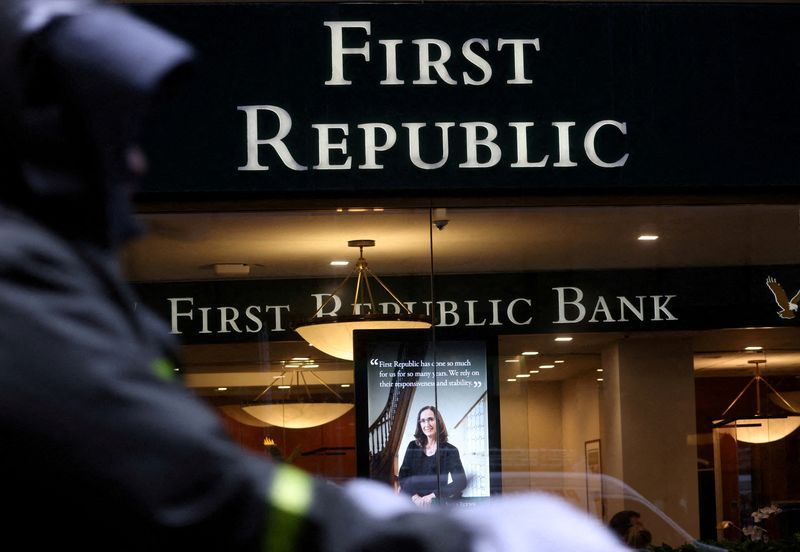(Reuters) - First Republic Bank (NYSE:FRC)'s efforts to secure a capital infusion continued without success on Tuesday, as the troubled regional lender started to plan for the possibility it may need to downsize or get a government backstop.
Major banks and private equity firms have so far balked at offering First Republic the capital infusion it craves for fear of releasing losses on the bank's loan book and investment portfolio amid a rise in interest rates.
On Tuesday, Reuters reported First Republic is examining how it can downsize and sell parts of its business, including some of its loan book, in a bid to raise cash and cut costs.
This could help the bank tackle its negative book value - the gap between its liabilities and its assets - which analysts and investors estimate to be between $9.4 billion and $13.5 billion.
Bloomberg News reported U.S. officials and Wall Street leaders seeking to aid First Republic were exploring the possibility of government backing that would help overcome the issue of the bank's unrealized losses.
The government could play a role in taking out assets that have eroded First Republic's balance sheet, Bloomberg reported on Tuesday, citing people with knowledge of the discussions.
First Republic declined to comment. In a message to clients posted on its website on Tuesday, the bank said it remained "well-positioned to continue to manage deposit activity."
Shares of First Republic tumbled 9% in extended trade on Tuesday evening. Some investors associate potential government interventions with the regulatory takeovers that followed the failures this month of Silicon Valley Bank and Signature Bank (NASDAQ:SBNY) and resulted in the wipeout of their shareholders.
"People just get nervous that if the government steps in there's going to be nothing left for shareholders," said Dennis Dick, a trader at Triple D Trading in Ontario, Canada.
The new scenarios for First Republic come as major bank chief executives gathered in Washington, D.C., for a two-day scheduled meeting starting on Tuesday, sources familiar with the matter said.
The quarterly meeting of the Financial Services Forum included the CEOs of JPMorgan Chase & Co (NYSE:JPM), Jamie Dimon, and Bank of America Corp (NYSE:BAC), Brian Moynihan, the nation's two largest lenders, the sources said.
First Republic's shares had surged as much as 60% on Tuesday before closing up 30%, but even so First Republic's stock has lost over 80% in value in the past two weeks. Its market value stood at $3 billion, down from $27 billion in early February.
JPMorgan is advising First Republic on its options to raise capital from investors, a source familiar with the situation previously said.
The banks were aiming to work out details for what needs to be done for First Republic within the coming 24 hours, another source said.
Eleven lenders, including the eight members of the Financial Services Forum, threw First Republic a lifeline of a combined $30 billion in deposits last week.
The U.S. banking system is showing signs of stabilizing, but further steps to protect bank depositors may be warranted if smaller institutions suffer deposit runs, U.S. Treasury Secretary Janet Yellen said.
In a sign of easing jitters, traders now expect the Federal Reserve to raise interest rates on Wednesday at the close of its two-day policy meeting. A week ago, fears of the deepening financial crisis had traders betting the Fed would hit pause on its battle against inflation.
The S&P 500 financial index climbed 2.5% on Tuesday, the largest one-day gain since November.
"There are a number of factors lifting the (financial) stocks, including the comments by Yellen. We have the Fed meeting tomorrow, so there's some anticipation of that," said Macrae Sykes, portfolio manager for the Gabelli Financial Services Opportunities ETF.
VOLATILE STOCK
The recent selloff in bank stocks triggered by the collapse of Silicon Valley Bank and Credit Suisse, which was rescued on Sunday by UBS, has some investors looking for bargains.
"The stocks are more inexpensive today than they were during the pandemic, and if you don't buy banks here, we aren't sure when you do," Baird analysts said in a client note. The market is currently pricing in a permanent reduction of up to 50% in returns on assets, it said, calling that "beyond silly."

Other investors remained skeptical of First Republic's stability.
"We believe First Republic remains in crisis," said Jason Benowitz, senior portfolio manager at CI Roosevelt.